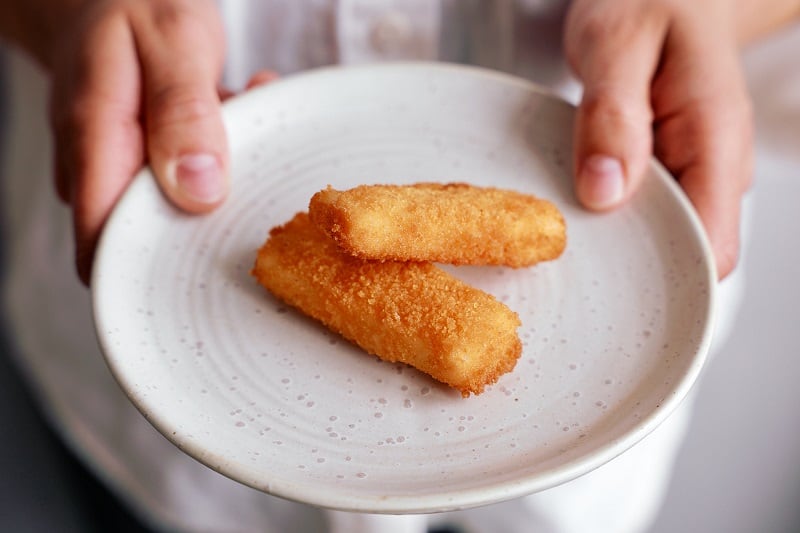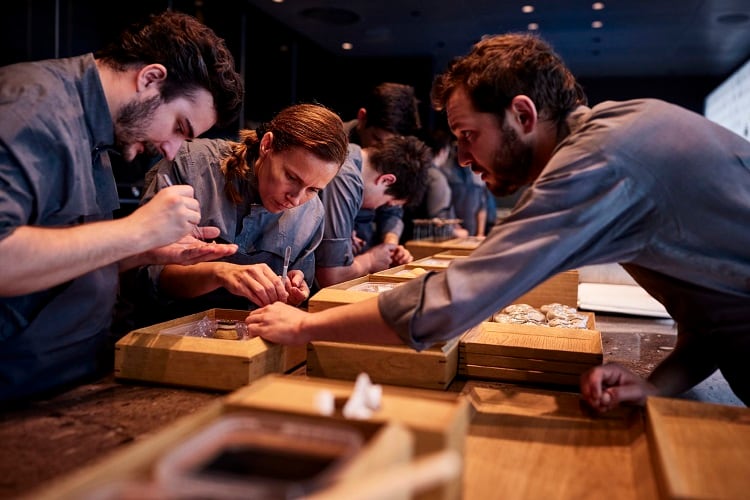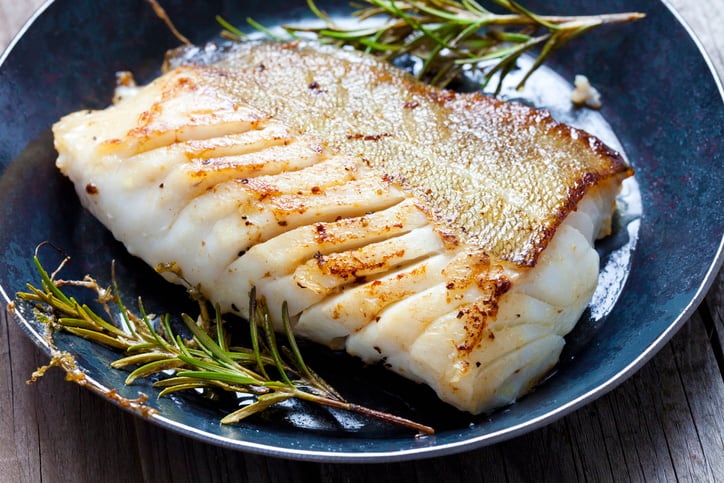The Berlin-based start-up’s fish fingers and fish balls contain cultivated fish cells as the main ingredient. Plant proteins are added to optimize cooking behaviour and mouthfeel.
Bluu Seafood targets initial approval and market launch in Singapore by the end of 2023, as yet the only country to approve cultivated meat products. The company will also apply for approval in the UK, EU and US.
In addition to fish balls and fish fingers, Bluu Seafood has also developed first prototypes of more complex products such as fillets and sashimi. The company's products are made using animal serum‐free growth media and are based on proprietary, non‐GMO trout and salmon cell lines.
Founder and CEO Dr Sebastian Rakers said: "With the completion of our first products, we can demonstrate visible and edible results after less than two years of operational work. This officially makes us the first company in Europe to produce cultivated fish. We are now working closely with regulatory agencies to clear the way for market launch and are using the time to focus on scaling."
He told FoodNavigator: "As the definition of the regulatory process is most advanced in Singapore, we expect to see a first approval there. In the UK and the EU, Bluu Seafood is currently aiming to apply for approval of the fish balls and fish fingers at some point during the second quarter of 2023."
Initially, the company will focus on B2B partners, most likely high-end restaurants, and food services. "In the beginning, the production capacities will still be limited and scaling to serve the mass markets will take some time," said Rakers. "However, as the industry matures, we will see these effects and are confident that cultivated fish will be able to reach cost parity with conventional products in the next three years."
Bluu Seafood says it aims to combine cell and food technology to grow a variety of sustainable, tasty seafood products directly from animal cells without compromising animal welfare and with a significantly smaller environmental footprint than conventional fishing.
Bluu Biosciences claims it is the first company in Europe to specialise in the development and production of cell-based fish, or fish meat produced from fish cells that is grown in a bioreactor. Bluu claims that producing cell-based fish without harming the ecosystem and at competitive prices can make a critical contribution to global animal protein supply security in the future.
Other advantages of cultivated fish, it says, include its high nutritional value, the absence of pollutants, its availability even in places without access to the sea and the associated short supply chains.
It claims the production process is resource-friendly and has a significantly lower CO2 footprint as well as water and energy consumption compared to the conventional fish processing industry.
What’s more, it asserts that cell-based fish is an animal product that, unlike wild-caught fish, is obtained without compromising animal welfare. According to the Food and Agriculture Organization of the United Nations, for example, about 90% of all edible fish stocks are already considered maximally exploited or overfished, while demand continues to rise as the world's population grows.
How does it work?
The company claims that cell-based seafood has a simpler structure than cultivated meat. Starting with a single biopsy from a fish, the cell lines are developed out of adult stem cells which are grown within a bioreactor and fed a serum-free growth medium.
The process is more energy efficient than cultivated meat, it claims. Fish cells can be cultivated at room temperature, which saves energy cost while mammalian cells need 37°. Fish cells are more tolerant to varying oxygen levels than mammals, an advantage for bioreactors with low oxygen levels.
Asked which plant proteins have been added to the product to optimize cooking behavior and mouthfeel, Rakers explained: "We have added plant-based proteins from soy and potato. We started with fish balls and fish fingers but are also developing more complex sashimi and fillet. The former products are made by mixing pure, unstructured cell mass with plant-based proteins, which provide them with better texture than just using the pure cell mass. With this we achieved a structure that is indistinguishable from conventional fish balls or fish fingers. For the more complex products of sashimi and fish fillet we will not have to add plant-based proteins, because these products will be grown on scaffolds which then provide the structure."
Scaffolding relates to structure needed inside the bioreactor for the cells to form into the different parts of meat: skeletal muscle, fat, and connective tissues etc.
Why cell-based seafood?
Heavy fishing and marine pollution are threatening fish stocks worldwide. The United Nations Food and Agriculture Organization (FAO) estimates that more than 90 percent of the world's fish stocks are either overfished (33.1%) or fished to maximum sustainable levels (59.9%). Therefore, sustainable alternatives are needed to ensure a long-term supply of animal protein for the world's population. Bluu Seafood is working to create one of those alternatives with cultured fish that is delicious, healthy, and sustainable.
"Conventional seafood production has reached its limits as more than 90 percent of edible fish stocks are exploited to maximum levels, which poses a serious threat to marine ecosystems,” said Rakers. “With Bluu Seafood, we can make an important contribution to the supply of animal protein that allows us to manage our oceans in a way that conserves resources and hopefully also promotes biodiversity in this habitat that is so important to all of us."
Last year the company secured €7 million in funding from leading global food and impact investors such as Manta Ray Ventures (UK), CPT Capital (UK), Lever VC (USA), Norrsken (SE) and Be8 (GER). The founding of Bluu Biosciences was supported by the Berlin-based company builder EVIG, which specialises in working with scientists to build biotechnology start-ups in the food sector.
Bluu Seafood (formerly Bluu Biosciences) was founded in 2020 by Dr Sebastian Rakers and Simon Fabich with an expert team of marine biologists, cell biologists, tissue engineers and food engineers.
It rebranded into Bluu Seafood with the new name reflecting the change from a predominantly research-oriented biotech to a more product-focused foodtech.
“We believe that cultivated fish will be an important alternative source of protein to feed the world's growing population in the future, and Bluu Seafood is well positioned to tackle the upcoming scaling process,” stressed Dr Christian Dammann, Chief Operating Officer of the company. “Fish and fish products are traded and consumed internationally, so from our perspective it makes sense to start with a brand name that is widely understood and immediately tells consumers what it is all about.”





